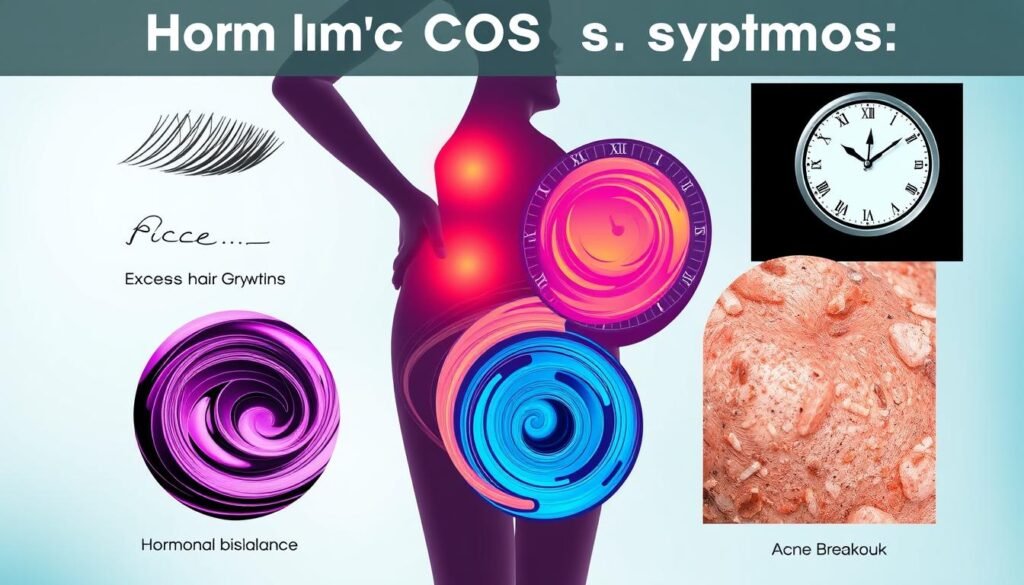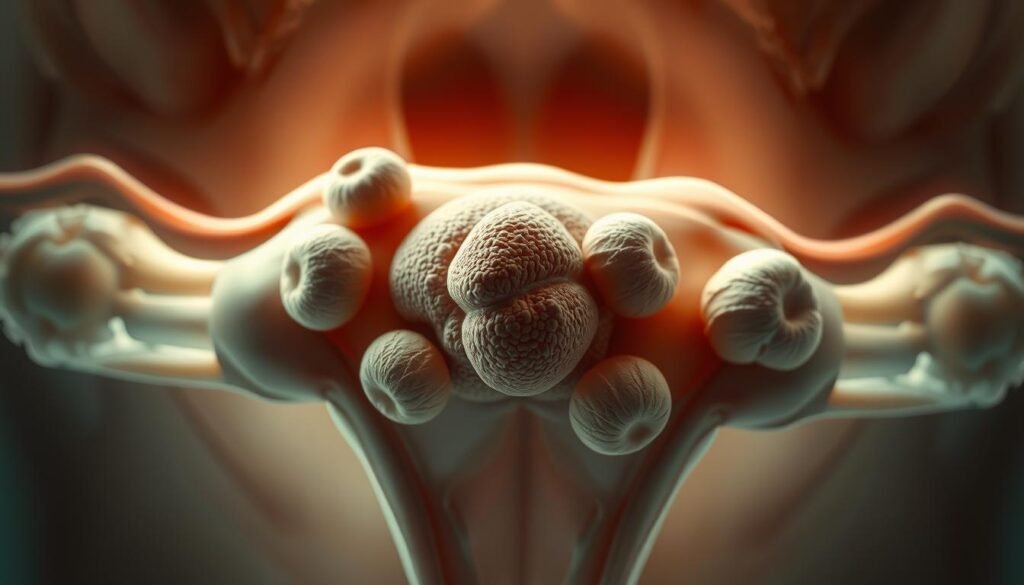Did you know 1 in 10 women of childbearing age has Polycystic Ovary Syndrome (PCOS)? Yet, up to 70% of these women don’t know they have it. PCOS is not just about hormones. It leads to symptoms that greatly affect daily life. This article looks at the pain PCOS can cause. We’ll cover symptoms like irregular periods and painful menstruation. Plus, we will talk about why it’s so important to know and manage this condition. If you have PCOS, understanding your symptoms is the first step to controlling them.
Key Takeaways
- PCOS affects approximately 1 in 10 women of childbearing age.
- Symptoms often include irregular periods, weight gain, and excessive hair growth.
- Many individuals with PCOS experience pain related to their symptoms.
- Insulin resistance is common, affecting 30%-80% of those with the condition.
- Up to 70% of women with PCOS do not know they have it.
- Understanding PCOS is essential for effective symptom management.
- PCOS poses risks for diabetes, high blood pressure, and fertility issues.
Overview of Polycystic Ovary Syndrome (PCOS)
Polycystic Ovary Syndrome (PCOS) is a hormonal disorder affecting many women of childbearing age. This overview of PCOS shows it messes with hormone levels. This leads to different symptoms like acne, a lot of hair growth, and problems getting pregnant. About 4% to 20% of women may face this issue, proving its importance in women’s health.
While we don’t fully get the PCOS causes, several factors seem to play a role. Resistance to insulin is a major factor linked to this condition. This is often seen with obesity and genes playing a part. 60% to 80% of people with PCOS end up having too much androgens. This causes more hair growth and messed up periods.
People with PCOS deal with many symptoms because of hormonal imbalance. This imbalance can cause lots of health problems, like making it hard to have a baby. With PCOS being the reason for 40% of issues with female fertility, spotting the signs early and getting the right treatment is key.
To better understand PCOS and how it shows up, action is needed. Knowing the symptoms and looking at ways to manage them is crucial. For more on symptoms and how to handle them, check out this resource.
| Factor | Percentage |
|---|---|
| Women affected by PCOS | 4% to 20% |
| Female infertility cases due to PCOS | 40% |
| Patients with hyperandrogenism in PCOS | 60% to 80% |
Common Symptoms Associated with PCOS
Understanding PCOS symptoms is key to manage this condition. It appears differently in many individuals, making it vital to know when to seek care. The common symptoms are irregular periods, painful menstruation, and too much hair growth, known as hirsutism.
Irregular Menstrual Cycles
Irregular periods are a major PCOS symptom. Those with PCOS often have unpredictable periods. It makes figuring out ovulation tough. In the U.S., 6-12% of women of childbearing age deal with these irregularities. This issue can harm reproductive health and may lead to infertility if ignored.
Painful Periods
Painful periods are a serious PCOS symptom. Many report pain and cramps during menstruation. This pain stems from hormonal imbalances common in PCOS. For those with severe pain, it’s crucial to talk to a doctor about ways to reduce this pain.
Excessive Hair Growth (Hirsutism)
Too much hair growth, or hirsutism, impacts many with PCOS. High androgen levels like testosterone are to blame, leading to unwanted hair growth. This situation often hurts one’s self-esteem. It’s important to treat hirsutism as part of PCOS care.

Is PCOS Painful?
Polycystic Ovary Syndrome (PCOS) is tough to deal with. It has symptoms like pain which often doesn’t get much attention. People with PCOS talk about pain in their lower belly and pelvic area. It’s key to understand this pain to help those struggling.
Understanding Pain Related to PCOS
Pain from PCOS can come from different places. High levels of certain hormones may cause abdominal pain. Ovarian cysts, though not always present, can disrupt life. A dull ache that spreads to the back and thighs is a common PCOS discomfort.
Pelvic and Abdominal Pain
Pelvic pain is a major sign for women with PCOS. It can show up as painful sex, unexpected weight gain, or a swollen belly. Pain from ovarian cysts makes the pelvic pain worse. This adds to the stress of having PCOS. Changing your lifestyle, like more exercise and eating right, helps manage the pain. Working out 3 to 5 times a week makes a big difference.
For moderate pain, over-the-counter meds like ibuprofen are useful. Using a heating pad or taking a hot bath also helps. Eating balanced meals with complex carbs and omega-3s can lessen inflammation and help with insulin.

About 1 in 10 women in their childbearing years have PCOS. Recognizing pain as a key symptom is crucial. For more on dealing with PCOS pain, check out this resource. Understanding and managing pain improves lives and lets women take control of their health.
| Symptom | Management Strategies |
|---|---|
| Pelvic Pain | Exercise, NSAIDs, Heat Therapy |
| Abdominal Pain | Balanced Diet, Exercise, Medication |
| Emotional Distress | Nutrient-Rich Foods, Support Groups |
There’s no cure for PCOS, but understanding pain helps find ways to cope. Resources offer tips to manage PCOS challenges, including pain. For lifestyle tips, visit this link.
The Role of Ovarian Cysts in Pain
Ovarian cysts are fluid-filled sacs on or in the ovaries. They are part of reproductive health, especially in women with Polycystic Ovary Syndrome (PCOS). Though many don’t cause problems, some can be painful, especially if they rupture or twist.
What Are Ovarian Cysts?
Ovarian cysts can be functional or pathological.
- Functional ovarian cysts are typical. They are part of the menstrual cycle. Most don’t need treatment and are harmless.
- Pathological ovarian cysts come from abnormal cells. They are less common. Some may be cancerous, especially after menopause.
How Ovarian Cysts Contribute to Discomfort
Some cysts don’t cause symptoms. But, big ones or those that burst can hurt a lot. Signs of a ruptured cyst include:
- Sudden, severe pain in the belly
- Bloating
- Feeling sick and throwing up
- Fever and feeling dizzy
PCOS can make your ovaries hurt because of many small cysts. It’s important to see a doctor if the pain is bad, especially with other worrying signs. Treatment depends on the cyst’s size, symptoms, and your health. Checking in with doctors can help you manage your cysts. For more about ovarian cysts and PCOS, visit this resource.

It’s key to understand ovarian cysts and how they might cause pain. This is very true for those with PCOS. Professional advice is crucial for managing pain and improving health. For more on handling PCOS, check out this link.
Impact of Hormonal Imbalance on Symptoms
In PCOS, hormonal imbalances play a big part. They deeply affect those who have it. Between 2.2% and 26.7% of women of childbearing age experience this syndrome.
Higher androgen levels are linked to irregular menstrual cycles. This often leads to painful periods with heavy bleeding. This could result in anemia, highlighting the role of hormones in PCOS symptoms.
Insulin resistance and hormonal imbalance worsen PCOS symptoms, lowering life quality. Making lifestyle changes, like a low-carb diet, helps. Even losing 5 to 10% body weight can regulate periods and ease symptoms.
Hormonal shifts affect more than physical health; they hit emotional wellness too. Acne, excessive hair, and random periods can lead to stress and sadness. So, understanding hormones is key for handling PCOS symptoms.
| Hormonal Imbalance Effects | Common Symptoms |
|---|---|
| Elevated Androgen Levels | Irregular Periods |
| Insulin Resistance | Weight Gain |
| Irregular Ovulation | Painful Periods |
| High Estrogen Levels | Excess Hair Growth (Hirsutism) |
| Thickened Uterine Lining | Increased Risk of Endometrial Cancer |
Weight Gain Challenges and Pain Perception
People with weight gain issues often face symptoms linked to PCOS. This condition and weight gain are closely connected. For many, it brings both physical and emotional struggles. Weight increase affects insulin levels, important in PCOS management. Hormone imbalances from PCOS can lead to more weight gain and discomfort. This cycle affects a person’s health deeply.
Relationship Between Weight Gain and PCOS
Studies suggest many with PCOS have trouble with weight gain. They see changes in body shape, like more belly fat. This can make PCOS symptoms worse, affecting periods and fertility. PCOS is common in young women, especially those aged 18-24 and 25-34. Dealing with weight makes finding a healthy lifestyle harder.
Inflammation and Pain in PCOS
PCOS and weight gain often cause chronic inflammation. This leads to more pain. Fat cells create substances that increase pain, impacting activity and mood. Inflammation connects to issues like migraines, making pain management key. More insights on PCOS symptoms and pain relief are crucial. Treatments like pelvic floor therapy can help manage pain.
Infertility Issues and Associated Pain
Many women with PCOS face a huge challenge: infertility. This condition affects 5% to 10% of women aged 15 to 44. It’s a top reason for infertility. Not all with PCOS will struggle to conceive, but many deal with issues. These stem from not ovulating regularly, leading to stress.
The struggle can get harder when trying to have a baby or dealing with hormone treatments. Procedures like IVF can add to the discomfort. It’s crucial to manage this pain. The emotional toll of infertility can make things worse. This shows the need for strong support for those affected.
There are ways to treat infertility caused by PCOS. Changing your lifestyle, like diet and exercise, might help with ovulation. Drugs like Clomid can also trigger ovulation, but they might not work for everyone. In tough cases, fertility treatments could be the next step.
Understanding these issues helps women with PCOS who are trying to conceive. Getting support from doctors and emotional help matters a lot. This support can change their experience, easing both the emotional and physical pain.
Metabolic Disorders Related to PCOS
Polycystic Ovary Syndrome (PCOS) impacts more than just reproductive health. Nearly 5 million U.S. women suffer from it. Many develop metabolic disorders like diabetes and heart issues. These can worsen PCOS symptoms and affect overall health.
Women with PCOS are four times more likely to get metabolic syndrome. This is true even without gaining weight or high cholesterol. Being overweight increases this risk. Making healthy lifestyle changes is crucial.
It’s important for those with a high BMI to get screened regularly. They should do this every 2 to 3 years to manage risks.
Knowing how PCOS and metabolic disorders are connected helps in finding the right treatment. Combining lifestyle changes with medicine can help. This approach improves women’s health and well-being with PCOS. It leads to better emotional health and less pain.